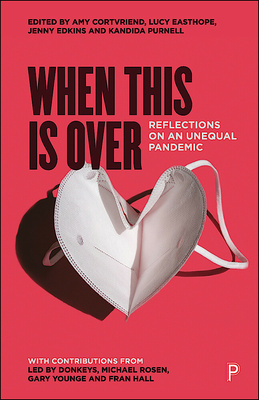On 18th July the UK’s COVID-19 Inquiry led by Baroness Heather Hallett published its first report and made recommendations covering its investigations into Module 1 on ‘Resilience and Preparedness’. It concluded that the UK had prepared for the ‘wrong pandemic’ and in doing so vindicated the arguments and testimonies made in our book When This Is Over: Reflections on an Unequal Pandemic.
As if paraphrasing our book, the report’s summary details how ‘emergency planning failed to put enough consideration into existing health and social inequalities and local authorities and volunteers were not adequately engaged’ and how ‘there was a failure to fully learn from past civil emergency exercises and outbreaks of disease’.
Written in 2022 by academic, practitioner, civil society and activist contributors and published in March 2023 – three months before the COVID-19 Inquiry began its hearings – When This Is Over provides a comprehensive account and takes stock of the socioeconomic inequalities and injustices engendered and exacerbated through the pandemic emphasising particular issues of race, gender and class throughout. Featuring contributions from emergency planners themselves, our volume also details exactly how to overcome and implement change going forward.
The findings from the Inquiry’s report into ‘Resilience and Preparedness’ particularly echo our volume’s first section which takes stock of inequalities pre-existing, exacerbated and embodied by the COVID-19 pandemic through an evaluation of the extent to which we really were ‘in this together’. The book provides a record of diverse everyday pandemic experiences – of men and women, of the young and old, of the working, middle and upper class, and of white people alongside people experiencing racism. However, what is frustrating is that – as the practitioners tell us in this volume – these were ‘known knowns’ within and throughout local and regional organisations and among planners and officials. Indeed the Inquiry’s summary of Module 1 recognises that:
“…advisers lacked freedom and autonomy to express differing opinions, which led to a lack of diverse perspectives. Their advice was often undermined by ‘groupthink’ – a phenomenon by which people in a group tend to think about the same things in the same way.”
In light of this damning acknowledgement, it is now vital that voices raised in When This Is Over are finally heard before the Inquiry reports on the remaining modules. The final part of our volume is devoted to raising those exact voices and focuses on chapters from those emergency planners charged with looking to the future in very grounded terms. As Matthew Hogan puts plainly,
“Emergency managers knew a pandemic was coming. Epidemiologists knew a pandemic was coming. Infectious disease scientists and intensive care specialists knew a pandemic was coming. Together, and with many others, we wrote plans.”
This final section of When This Over pleads for emergency planning to be given the credence and weight that it deserves.
Lucy Easthope’s chapter illustrates how emergency planners have kept the receipts, and evidences how in the years preceding the pandemic, emergency planners:
“…wrote strategies and ethical frameworks – tools that could be used to decide which patient would get the last ventilator – and lengthy lists of after-shocks. We exercised what life might look like in a pandemic and what choices would need to be made. In 2016, a national exercise tested the aftermath of a flu pandemic. In the same year, the government tested a coronavirus pandemic.”
In short, When This Is Over shows irrefutably how the idea that COVID-19 was ‘unprecedented’ was simply a lie and must not be used to excuse those who chose to ignore existing plans. However, the volume also contains solutions providing a glimmer of possibility that we may yet see a more equal society emerge from the COVID-19 ashes, should the Inquiry choose to pay attention to the voices raised and recommendations made before it is too late.
Amy Cortvriend is Lecturer in Criminology at the University of Northampton. Lucy Easthope is Professor in Practice of Risk and Hazard at the University of Durham and Fellow in Mass Fatalities and Pandemics at the Centre for Death and Society, University of Bath. Jenny Edkins is Honorary Professor of Politics at the University of Manchester and Emeritus Professor in the International Politics Department, Aberystwyth University. Kandida Purnell is Associate Professor of International Relations at Richmond, The American International University in London.
 When This Is Over edited by Amy Cortvriend, Lucy Easthope, Jenny Edkins and Kandida Purnell is available on the Bristol University Press website. Order here for £14.99.
When This Is Over edited by Amy Cortvriend, Lucy Easthope, Jenny Edkins and Kandida Purnell is available on the Bristol University Press website. Order here for £14.99.
Bristol University Press/Policy Press newsletter subscribers receive a 25% discount – sign up here.
Follow Transforming Society so we can let you know when new articles publish.
The views and opinions expressed on this blog site are solely those of the original blog post authors and other contributors. These views and opinions do not necessarily represent those of the Policy Press and/or any/all contributors to this site.
Image credit: Kelly Foster via Wikipedia


